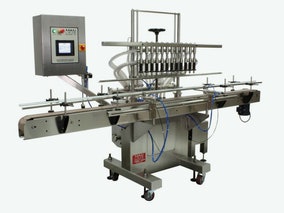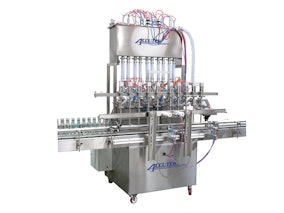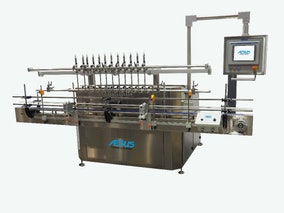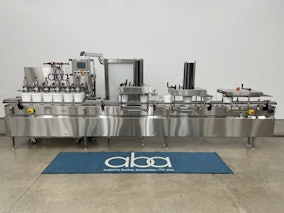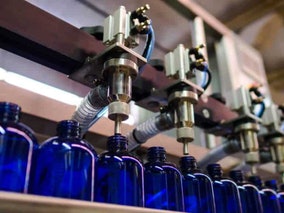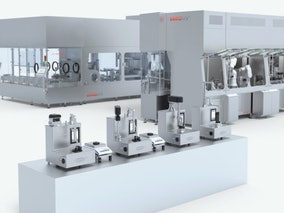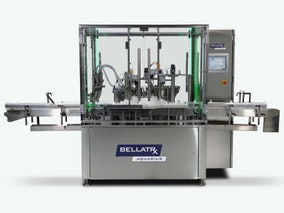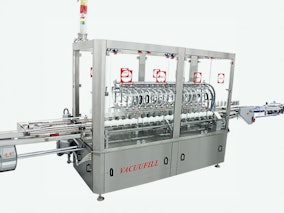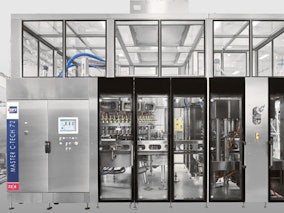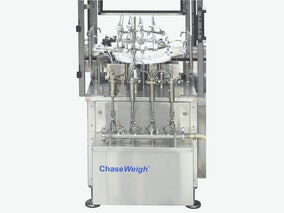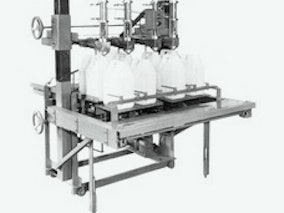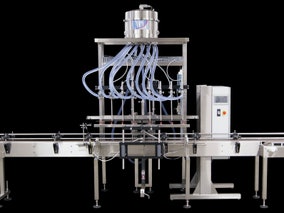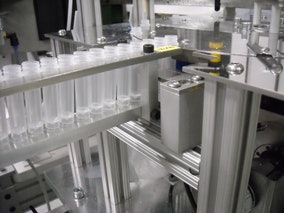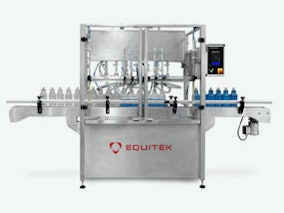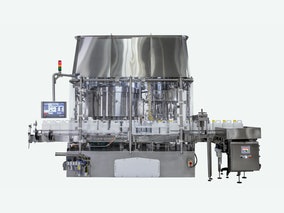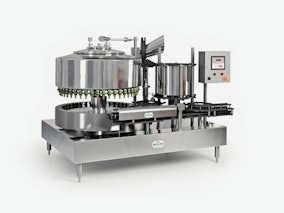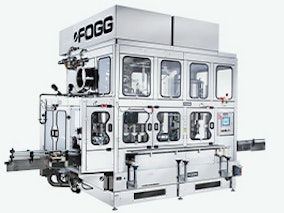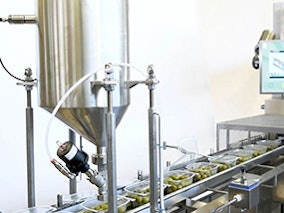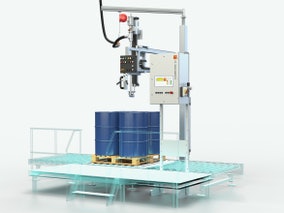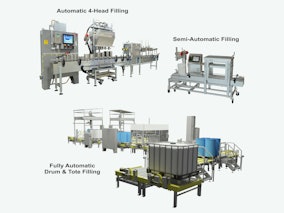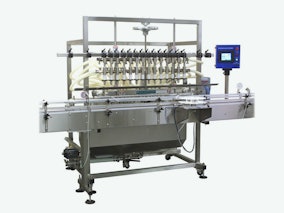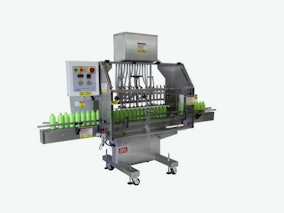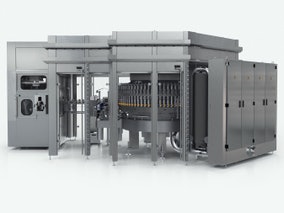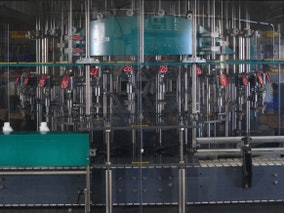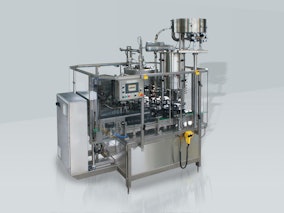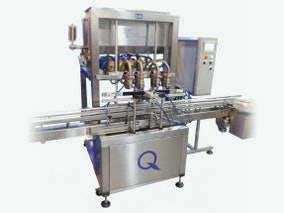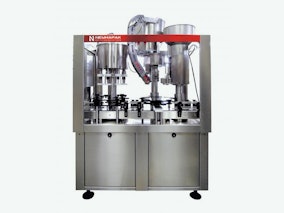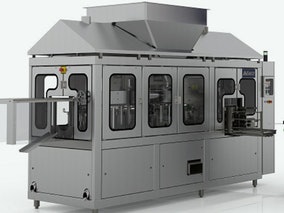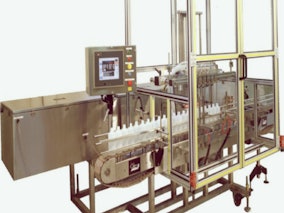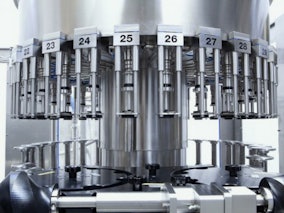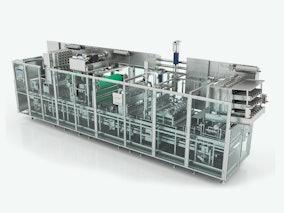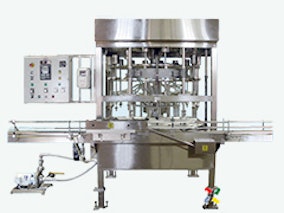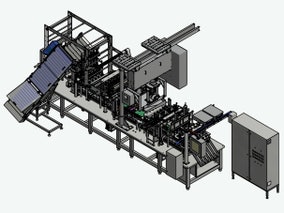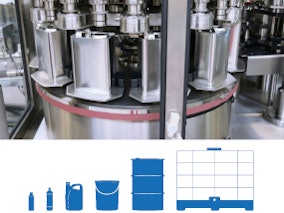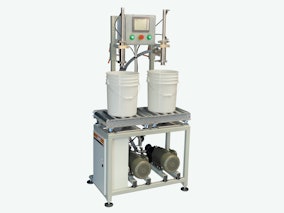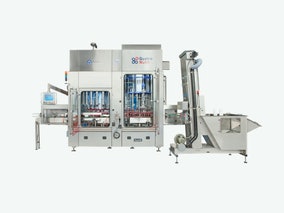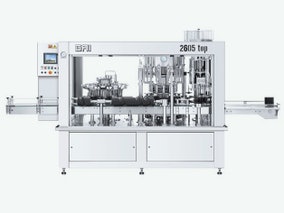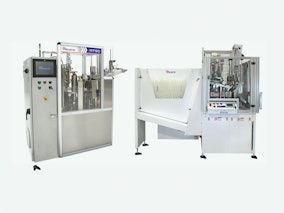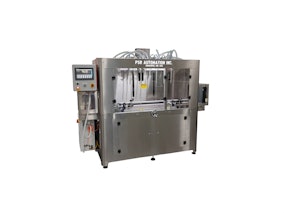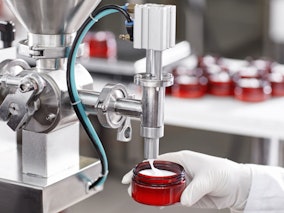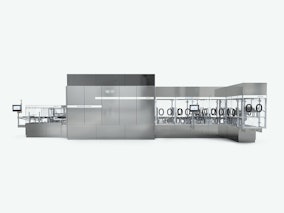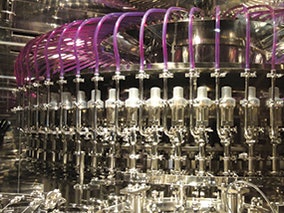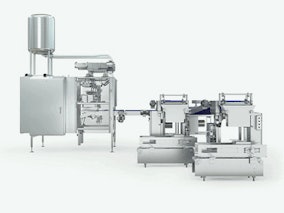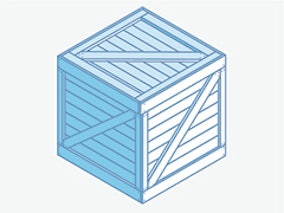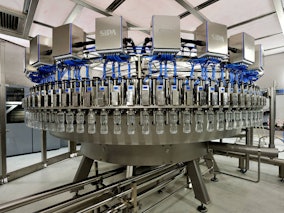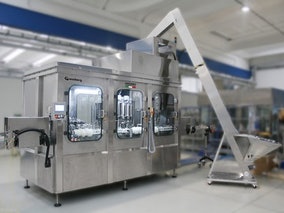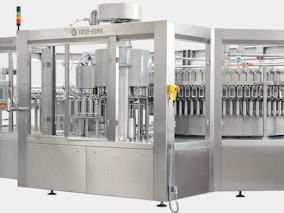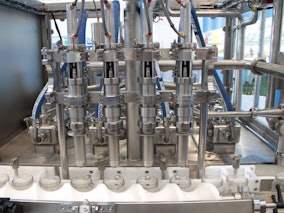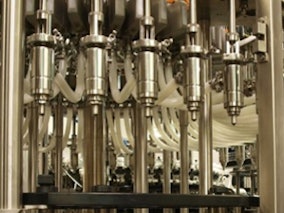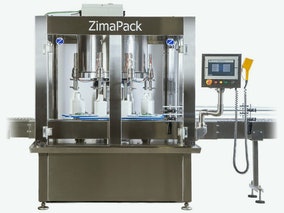Gravity Fillers
(50 companies)Also called gravimetric fillers, these liquid filling machines dispense typically water-thin or low viscosity liquids from an upper chamber by dropping the product into a container, such as a bottle. Are you considering purchasing new filling, capping or closing machinery? Learn more about what to look for in your next purchase.
-

Acasi Machinery Inc
Acasi Machinery offers a wide product line of liquid filling machines including piston fillers, overflow fillers, pump fillers, flow meter liquid filler among other designs. Bottle filling machines are designed to accommodate a large range of products from thin liquids to thick products with or without particles as well as a range of speeds with semi-automatic bottling machines to inline filling machines automatic and semi-automatic to accommodate speeds up to 120 bottles per minute. Acasi’s rotary fillers accommodate faster speeds of up 300 bottles/minute.
You are currently not logged in -

Accutek Packaging Equipment Co., Inc.
For more than three decades, Accutek has been renowned for delivering exceptional liquid-filling machines to its customers. The specific requirements of the customer's products dictate the type of bottle-filling machine that is best suited for the task. Accutek's objective is to ensure the accurate dispensing of the product in an appealing bottle that effectively highlights the product’s offerings, giving brands a competitive edge. Accutek's machine offerings encompass a wide range of options, including timed fill filling machines, piston filling machines, level filling machines, vacuum filling machines, pump filling machines, net weight filling machines, tablet counters, and corrosive filling machines.
You are currently not logged in -

Aesus Inc.
Aesus Inc. manufactures liquid fillers that can handle a range of viscosities, from water and water-like liquids to oils and creams. Filling machines feature simple dial-in fill volume adjustments to change over from applications requiring milliliters from ones requiring gallons, all on the same machine. Running up to 160 bottles/min., the Aesfill AF 4 Liquid Filler is a fully guarded, variable speed, bottom-up fill system with features such as neck clamp, no-bottle/no- ill feature, no-fill feature for misaligned dive, a bottle back-up machine stop, recipe management with color touchscreen, clamp on/off contact parts for fast changeover and no-drip nozzle fills. Liquid filler can run a range of sizes, from 3 ml to multiple gallons.
You are currently not logged in -

Anthony Barber Associates, Ltd.
Anthony Barber Associates, Ltd. manufactures liquid filling machines and lid placing and closing machines for both domestic and international markets. The product line includes high-quality equipment typically used for filling paint, chemicals, coatings, and other liquids. Every machine is custom-designed to meet specific customer requirements. The company's volumetric filling machines are designed to be fast, easy to use, and feature double-acting piston pumps, ensuring product is always on both sides of the piston. Pumps are available in 1-gallon (5-liter) and 5-gallon (20-liter) sizes. Net weight filling machines incorporate the latest software, offering historical and real-time trending, as well as remote support for troubleshooting and service. These fillers are known for their high accuracy and ease of cleaning.
You are currently not logged in
-

Apex Filling Systems
Apex Filling Systems designs and manufactures custom solutions for gravity, overflow, piston and pump filling systems that handle free-flowing liquids, viscous or thick liquids, foamy products, products that string or drip, and products with particulates or chunks. Machines include the Automatic Gravity Filler, for filling thin liquids with consistent viscosity, and the Economy Two-Head Automatic Piston Filler, designed with entry-level businesses that are filling liquids, semi-solids and products with particulates in mind. Other liquid fillers include the Automatic Piston Filler, which produces repeatable and accurate fill volumes for viscous liquids, semi-solids and products with particulates for applications in the food service, cleaning and specialty chemical, pharmaceutical, cosmetic and personal care industries.
You are currently not logged in -

Bausch + Stroebel Machine Company Inc.
Bausch & Stroebel Machine offers liquid filling systems for pharmaceutical production applications. Featured products from its extensive line include the AFV filling and closing of ampoules and vials, which uses rotary piston pumps in continuous, intermittent-motion rotary machines as well as intermittent-motion linear formats.
You are currently not logged in -

BellatRx Inc.
BellatRx offers a full range of fully automatic and semi-automatic packaging systems to fill non-viscous and viscous liquids accurately. Liquid fillers include monoblocs, inline fillers, piston and tube fillers, that handle microtubes, vials and cartridges in pharmaceutical, cosmetic, biotech, food, e-liquid and other industries.
You are currently not logged in -

Capmatic Ltd.
Capmatic supplies an extensive range of liquid filling machines for a wide variety of applications from pharmaceutical to food and beverage applications and beyond. Capmatic offers machines with inline, pressure, gravity fill, piston, peristaltic, piston, gravity, tare in/tare out filling technologies ranging from tabletop units to monobloc configurations. Featured amongst Capmatic’s dozens of liquid fillers is Vacufill, an automatic vacuum filler for liquid, semi-viscous and foamy products that is designed as a closed-loop system with negative pressure for applications including filling oils, perfumes, and nail polish.
You are currently not logged in
-

CFT SpA
CFT is a manufacturer of a broad range of food, beverage and non-food liquid filling systems in a variety of configurations and formats. Highlights from the CFT product line include the MAGIC FW automatic flow meter filler for hot/cold filling of viscous and smooth food products ranging in speed from 5,000 to 85,000 containers/hr. CFT also supplies hygienic weigh filling machines, level fillers for carbonated products, keg systems for beer filling, vacuum fillers for vinegar and syrup, gas fillers, volumetric fillers for oil and detergents and numerous other filling machines.
You are currently not logged in -

Chase-Logeman Corporation
Chase-Logeman’s monobloc filling equipment offers multiple capabilities while maintaining a small footprint, serving a wide range of industries that fill and close a variety of vials, bottles, and containers. Company designs and tests machinery to meet the specific needs of the end user because each machine is built for the specific application.
You are currently not logged in -

Crandall Filling Machinery Inc.
Crandall offers a full range of liquid fillers for pails and cans. Pail filler and drum filling machinery provides accurate, low maintenance, no-drip filling of liquid to viscous products into cans, pails, drums and totes. Featured in Crandall's wide ranging line of top fill, sub-surface, drum fillers and automated fillers are the FAPA4 and PA4 Auto Loader Can and Pail Fillers handling any non-foaming product that will flow, settle in the container, and does not contain hard solid particles. Filler handles any metal, glass, plastic or composite container that is rigid and has a rectangular shape or round shape with center opening, with container sizes from quart to 2-1/2 gallon (1 to 10 liters).
You are currently not logged in -

E-PAK Machinery, Inc.
E-PAK Machinery manufactures volumetric pressure and gravity filling machines suitable for filling virtually any water-thin to semi-viscous liquid. Gravity filling systems are ideally suited for thin, foamy products while pressure/gravity filling systems have the ability to handle slightly more viscous liquids. E-PAK customizes each model with the right combination of contact parts per end-user product requirements as well as the appropriate quantity of fill valves and accessories to meet current and future production demands.
You are currently not logged in
-

Engineered Automation of Maine
Engineered Automation of Maine supplies liquid filling equipment including vial, cartridge, jar filling and capping equipment. High-speed, high-precision container filling and capping equipment can be custom engineered to the customer’s product. Featured machines include a vial/tube filling system built to handle small polypropylene screw on cap microcentrifuge tubes and vials. This automated system is designed and built to feed vials and caps from vibratory bowls. The standard design can be modified to handle other similar products.
You are currently not logged in -

EQUITEK
Liquid filling systems from Equitek range from semi-automatic to automatic machines, handling non-viscous to viscous products. Equitek´s filling machines are engineered for medium size product runs of up to 350 cpm and handling applications of up to 4,000 pounds.
You are currently not logged in -

Federal Mfg LLC
Federal’s net weight liquid filling technology is ideal for applications needing exact dosing, with non-contact filling accuracy of ± 0.1% to minimize the giveaway of valuable products. Federal’s fillers handle a full range of container types including bottles, cans, jugs, pails, drums, and totes, with filling capacities ranging from 1 ounce (29.6 milliliters) to 250 gallons (946.4 liters) at speeds up to 1,000 containers per minute. Designed and available in multiple configurations including monobloc filler/cappers or tribloc rinser/filler/cappers, as well as standalone fillers, all Federal filling systems are engineered with a focus on accuracy, cleanability, quick changeover, and low maintenance.
You are currently not logged in -

Filler Specialties, Inc.
Filler Specialties specializes in the design, manufacture, and remanufacture of monobloc filler/cappers. Filler Specialties has the monobloc pressure gravity filling and capping machine features speeds from 10 to 700 containers per minute. Fillers run plastic and glass containers from 2 oz/60 ml to 2½ gallon/10 liter. Other features include EMV external mount filling valves. Standalone fillers and cappers are also available.
You are currently not logged in
-

Fogg Filler Company
Fogg Filler manufactures gravity fillers for flowable liquids that have fill speed capabilities from 25 to 1200 bpm. These machines can fill bottles for diverse markets, ranging from ESL and hot fill operations to applications in the dairy and the spirits industry. Typical products filled include juices, coffee, tea, whiskey, vodka, bourbon, water, traditional milk, nut milks, and many more.
You are currently not logged in -

Harpak-ULMA Packaging, LLC
Liquid filling system options from G. Mondini include gravity fillers, lobe fillers, and piston fillers, depending on the required accuracy, particulate size, and other factors. This broad range of liquid filling equipment ensures Harpak-ULMA has the proper equipment to match the customer’s needs.
You are currently not logged in -

Haver & Boecker USA, Inc.
Haver & Boecker offers liquid filling equipment through its Feige Filling brand. Semi-automatic and fully automatic liquid filling models from Feige Fillers handle various products ranging from the chemical industry to food-grade materials for drums of all sizes, pails, canisters and IBC totes. Feige Filling offers custom solutions, such as stainless steel construction configuration and nitrogen purging features.
You are currently not logged in -

Ideal Pase, A Massman Company
Ideal-Pak® liquid filling machines are designed to deliver the highest levels of precision, productivity, ease of use, and reliability in automatic, semi-automatic or manual configurations. Individually designed to suit the needs and budgets of their customers, Ideal-Pak® automatic liquid fillers include automatic PLC-controlled conveyor systems, lid placers and closers for hands-free operation. In addition, all Premier Line filling systems feature a touch screen HMI with recipe storage and SPC with check-weigh data logging and Ethernet connectivity to deliver the highest accuracy, consistent fills, and maximum throughput. Contact us today to find out more about our line of automatic liquid filling machines. Ideal-Pak®’s semi-automatic liquid filling machines deliver the flexibility to process smaller batches of product efficiently while maintaining high accuracy.
You are currently not logged in
-

In-Line Packaging Systems, Inc.
In-Line Packaging Systems offers liquid filling solutions for a wide range of applications, from carbonated beverage fillers to overflow filler and manual beer bottle fillers. The In-Line mini bottle filler and cap tightener system utilizes advanced technology and people-friendly controls to provide a simple and cost-effective method for container handling, filling and cap torqueing, accommodating plastic, glass, and metal containers ranging in sizes and configurations. Based on a fill-to-level principle, the Model OF Pressure Overflow Filler delivers a quantity of flowable liquid into the container until it reaches an adjustable fill height. Other models include an 8-head gravity overflow filler, a micro carbonated filler and related equipment.
You are currently not logged in -

Kaps-All Packaging Systems, Inc.
Kaps-All supplies machines designed for multipurpose liquid filling operations, from free-flowing to viscous products. Offering a wide range of filling methods and techniques in automatic, semi-automatic and rotary configurations, the Kaps-All product line includes the FA-G-E gravity filler, a fully automatic, microprocessor controlled machine for straight line liquid filling of free flowing liquids (including foaming thin products), suitable for glass, plastic or metal containers. Model FA-P Expandable Fills-All Model FA-P Pressure Filler features two stainless steel gravity/pressure nozzles that are adjustable for varying fill heights (expandable to 18 nozzles) and accommodates a bottle range of 1-3/4 inch high to 1 gallon containers (glass, plastic or metal).
You are currently not logged in -

KRONES
Whether for glass bottles, PET containers or cans, for filling, labelling or packing, for water, beer or soft drinks, Krones offers a customized system solution for every process step, every container type and every beverage category. The wide portfolio comprises all machines required for beverage production, including fillers suitable for every container type and labelers for all conventional labelling and decoration variants, as well as all dry-end systems.
You are currently not logged in -

Laub/Hunt Packaging Systems
Laub\Hunt Packaging Systems is a manufacturer of liquid filling equipment, offering a variety of filling systems for products ranging from water-thin to highly viscous. Inline and rotary fillers run at speeds up to 800+ cpm, filling any pumpable non-carbonated, non-dairy product. Additionally, Laub\Hunt specializes in bleach fillers as well as other filling equipment widely used in industrial and household chemicals, automotive fluids, personal care products, cosmetics, and food and beverages.
You are currently not logged in
-

Linker Equipment Corporation
Linker specializes in monobloc liquid filling systems for rinsing, filling and capping (RFC), water fillers, pressure gravity fillers, pressure fillers, metered fillers and net weight fillers for various types of containers, including 5-gallon. Featured fillers include the RFC for water filling, designed for automatic rinsing, filling (water, tea, and juices) and capping of glass or PET bottles. Features a range of 24 to 96 valves with a capacity of filling from 80 bottles of 0.5L to 1000 bottles of 0.5L per minute.
You are currently not logged in -

Liquid Packaging Solutions, Inc.
Liquid Packaging Solutions manufactures filling equipment for products thick and thin and bottles small and large. From fill-to-level and volumetric to net weight, piston fillers and more, LPS bottle fillers are designed to handle almost any liquid product.
You are currently not logged in -

Newmapak Ltd.
Newmapak distributes bottle and can fillers tailored for both low-volume and high-volume applications, carefully considering the viscosity of the client’s product, filling speeds, temperature requirements, and the integrity of the finished product. Their extensive product line includes machines designed for a wide range of applications, including beverages, sauces, oils, syrups, and other food products.
You are currently not logged in -

NIMCO Corporation
NiMCO offers a comprehensive product line of gable top carton fillers, ranging from manual top and bottom carton sealers to high speed units with spout applicators and carton sterilization systems. NiMCO’s liquid filling machines fill gable top cartons from 120 ml to 5 L for food and non-food liquids. NiMCO machines combine reliable mechanical operations with the latest in electronics to ensure leak proof seals and consistent trouble free production output.
You are currently not logged in
-

Oden Machinery, Inc.
From compact tabletop machines to industrial solutions, Oden Machinery offers a variety of options for liquid filling machines covering a wide spectrum of applications. Oden’s extensive product line includes pump fillers that handle liquids of varying viscosities, net weight fillers for filling large quantities, and gravity pressure fillers for water-thin and moderately viscous liquid. The Pro/Fill® 3000 Fully Automatic pump filler handles applications ranging from free flowing to very viscous; it also fills particulated, hot and abrasive products. Accommodating a wide range of container shapes in volumes from 15mL to 5 gallons the Pro/Fill® 3000 runs at speeds to 250 containers/min., with accuracies to ± 0.10% dependent upon dose size and product.
You are currently not logged in -

Omnia Technologies
Omnia Technologies distributes liquid filling systems from AVE Technologies. Featured machines include gravity filling systems for still beverages. Once the pre-set filling level is achieved, the product in excess is recollected to the filling tank. The filling tank is completely manufactured in AISI316, as well as all the parts in contact with the product. In case the machine has to treat PET/PE/HDPE bottles, the filler can be equipped with a neck holding system. Other filling systems include vacuum filling systems, isobaric filling machine, hot filling FHP, volumetric filling systems, as well as plastic and glass bottle filling machines.
You are currently not logged in -

Osgood Industries, LLC
Osgood Industries, LLC, a Syntegon company, specializes in filling and sealing technology for liquid and viscous food for cups and pre-formed containers, with applications in the dairy and food processing and packaging industry. Designing and manufacturing inline and rotary machines for denesting, filling, sealing, and capping of preformed plastic and paper containers, we support our customers in finding the right automated packaging solution for their specific application. Typical applications include products such as yogurt, sour cream, cottage cheese, margarine, ice cream, deli salads, readymade meals, prepared side dishes, hummus, sauces, soups, dips, pet food, coffee pods, and more.
You are currently not logged in -

Packaging Dynamics, Ltd.
Packaging Dynamics, Ltd. supplies Model SLA Automatic Straight-Line Fill to Level liquid filling machine for hard to fill foamy and viscous products. Featuring an Allen Bradley programmable Logic Controls (PLC) and operator interface, this machine is engineered for flexibility, filling containers as small as 2 oz and as large as 2 1/2 gal (F-style) at rates up to 80 containers per minute. Standard features include a product pump, reservoir, pressure manifold, AB photo sensors and a variable speed on-board 10 foot conveyor and drive system.
You are currently not logged in
-

Packline USA
Liquid fillers can be used for food industry applications such as filling sauces, salsas, hummus, deli salads and dips into a rigid container or pouch, with option of multiple products and toppings. Film sealed with modified atmosphere packaging (MAP) option and subsequent rigid lid placement.
You are currently not logged in -

PACK'R
PACK’R designs and engineers specialty liquid filling and capping machines to fit the customer’s container, factoring shape, material, size and cap. Offering the capability to fill containers ranging from the smallest bottle to jerrycans, pails and drums to the largest intermediate bulk container (IBCs) and totes, PACK’R engineers and technicians apply years of experience and extensive industry knowledge to designing and manufacturing filling and capping equipment for a wide range of industries, including chemical, agrochemical, petrochemical, vegetable oils, food, paint and coatings.
You are currently not logged in -

Paquip
Paquip offers a range of U.S.-manufactured pail, gallon, drum, and tote filling machines with easy product changeovers. Pail and drum filling machines are designed for small to mid-size production in industries such as chemicals, lubricants, food, and coatings. The XPG-100 is a semi-automatic filler for 1- to 7-gallon containers, featuring pump options, touchscreen controls, scale integration, and quick-change nozzles for clean product transitions. For higher throughput, the XPG-200 uses dual nozzles to fill two pails simultaneously. The DC-100 is a semi-automatic swing-arm filler built to handle four drums or a single IBC tote per cycle, offering diving nozzles, fill-profile memory, and accurate weight-based fills. All models support a variety of fluids and container sizes and are built for reliable operation in washdown environments.
You are currently not logged in -

Pneumatic Scale | Angelus
Pneumatic Scale | Angelus has a full range of filling machines for applications including non-free-flowing creams, pastes and slurries and liquid filling machines for applications across a wide spectrum of industries: food, beverage, dairy, chemical, household products, personal care, and pharmaceuticals. Capable of handling a wide range of product viscosities and consistencies, PSA’s liquid filler lines cover both electronic and mechanical fillers, in linear or rotary configurations, leveraging technologies including net weigh, volumetric and flow meter fillers. Featured liquid fillers include the Quatro Nutri filler, designed for the particulate and non-particulate sauce and dressings market. This machine is available in a monobloc configuration with capper or thermosealer, or the Combi configuration, which associates blowing, filling, and capping for PET bottles.
You are currently not logged in
-

Prospero Equipment Corporation
Prospero distributes a range of rotary filling equipment, including GAI’s liquid filling machines for wine and related products. The S family of fillers performs rinsing, de-aeration, filling, inert gas injection, and vacuum corking. Targeted to medium and small sized wine producers, the S series fillers can run still products up to 3,000 bph. These fillers are designed for high quality, reliability and ease of use. A wide range of accessories and machine extras are available to meet the needs of each producer.
You are currently not logged in -

ProSys Fill LLC.
ProSys is a leading manufacturer of semi-automatic and fully automatic liquid filling machines for various industries, including pharmaceutical, cosmetic, lubricant, food, sealant, and adhesive. Since 1985, they have provided filling solutions for squeeze tubes, syringes, airless pumps, cartridges, jars, custom containers, and hot melt applications, with U.S. sales, manufacturing, and customer service facilities in Southwest Missouri. ProSys offers flexible combination systems that handle plastic and metal tube filling, airless pumps, and cartridges with fill accuracy of +/- 0.1% by volume. Their equipment features turnkey designs, air-free vertical bottom-up filling, explosion-proof controls, and tool-free release systems for easy changeovers. ProSys also manufactures drum and pail presses, which provide efficient solutions for handling large-volume containers such as 5-gallon pails, offering both manual and pneumatic press options to ensure smooth material flow during filling of liquids.
You are currently not logged in -

PSR Automation Inc.
The PSR Automation Inc. Servo Filler is designed as a versatile machine that can fill products from 2-oz. containers to 2.5-gallon bottles without any change parts, and perform changeovers in under 15 minutes with the quick changeover system. "The PSR Servo Filler can increase your output by saving on changeover times and improving fill rates," says PSR.
You are currently not logged in -

QuadPax, LLC dba Cleveland Equipment
QuadPax, LLC dba Cleveland Equipment manufacturers a range of economically priced entry level liquid filling eqiupment for semiautomatic and automatic filling applications. Semiautomatic fillers include the SGP Series of piston filling machines, designed for liquids and creams, while the SGY Series is tailored for liquids only. Cleveland Equipnment also supplies manual, gravity-based siphon fillers for small- to medium-sized production runs, as well as tabletop gear fillers for filling products such as liquid soap and tabletop peristaltic pump fillers for non-viscous liquids in pharmaceutical and cosmetic industries. Other liquid fillers include overflow fillers, designed to ensure consistent fill levels across all bottles, regardless of their interior volumes. In addition, Cleveland Equipment can install an entire compact filling line (fill, cap, and label) in a small space.
You are currently not logged in
-

Romaco Group
Romaco Macofar is a global supplier of filling solutions for sterile and non-sterile powders and liquids. Romaco Macofar's systems are designed for flexibility and ease of validation to meet the specific requirements of customers in the pharmaceutical and cosmetics industries. Featured liquid fillers include the Macofar E sterile liquid filling lines, which includes a series of washers, depyrogenation tunnels and liquid filling machines for aseptic liquid filling of vials intended for injection at rates of up to 24,000 vials/hour. Other machines in Romaco Macofar’s extensive line include the LVI Series for sterile and non-sterile liquid filling and capping. Compact and versatile, LVI machines can be equipped with different types of liquid filling technologies and capping options. Suitable to handle a wide range of pharmaceutical liquid products, the machine can also be equipped with laminar flow and environmental controls for aseptic processes.
You are currently not logged in -

Shibuya Hoppmann
Shibuya Hoppmann offers the E-Beam and H202 aseptic liquid filling systems, as well as conventional filling and capping systems. Shibuya's line of filling systems is designed for flexibility; fillers handle multiple bottle shapes and sizes, including square and elliptical containers. Applications include juices, teas, coffee, milk, protein/energy drinks, or carbonated sodas. Liquid fillers use the net weight filling method for high accuracy. E-Beam aseptic filling systems require no chemicals or water required for bottle sterilization and are designed to help reduce the total cost of ownership (TCO).
You are currently not logged in -

SIG
Scholle offers a wide range of machines for filling liquids into spouted pouches via the spout, as well as bag-in-box and aseptic filling applications. Featured liquid fillers include the Scholle IPN SureFill® 44, a dual-lane, automatic, web-fed filling machine for applications including agricultural products, chemicals, alcoholic beverages, automotive fluids, cleaning chemicals, coffee and tea, dairy, functional drinks, juice, smoothies, soft drinks and water. Capable of packaging fresh products in 3- to 20-liter bag sizes, the machine features a filler that is equipped with a monitor interfaced to a programmable controller, assuring conditions during filling operations. All product contact surfaces are constructed out of 316L stainless steel and food grade construction. Capable of packaging clean fill (ambient) products, the system's airless fill pad reduces product splashing and foaming for superior protection from entrained oxygen. Clean-in-place (CIP) and sterilize-in-place (SIP) machine cycles are applicable.
You are currently not logged in -

SIGMA Equipment, Inc.
SIGMA Equipment offers a broad selection of used liquid filling machines catering to diverse industries, including food, beverage, cosmetics, and pharmaceuticals. Their inventory features equipment capable of handling products of various viscosities, from water-like liquids to thicker substances like creams and pastes. The offerings include volumetric, gravity, overflow, piston, and pump fillers, ensuring precise and efficient dispensing for containers of all shapes and sizes. With options suitable for small-scale operations to high-speed automated production lines, SIGMA provides flexible solutions to meet specific operational needs. Browse SIGMA's current machinery on sale at the link below.
You are currently not logged in
-

SIPA North America
SIPA offers a range of rinsing, filling and capping monoblocs designed to guarantee the highest quality standards in packaging a variety of beverages and liquids. SIPA’s machine offering includes the FLEXOTRONIC range of modular volumetric filling monoblocs for filling carbonated soft drinks, carbonated mineral water, non-carbonated mineral water, clear and pulpy juice, isotonic and sport drinks. The FLEXOTRONIC also handles sensitive products, including fresh or micro-filtered ESL milk, and drinkable yogurts as well as edible oil, home and personal care products. Other fillers include volumetric gravity filling monoblocs for large size containers, an isobaric filling monobloc, a gravity filling monobloc, and a mechanical gravity filling monobloc for hot fill applications.
You are currently not logged in -

SMI USA Inc
SMI USA’s liquid filling product line includes the compact ECOBLOC® range, which integrates the functions of a rotary stretch-blow molder, a rotary electronic filler, and a rotary capper into a single unit, for applications including flat and carbonated water, fresh milk, juices, edible oil, vinegar, carbonated soft drinks and detergents.
You are currently not logged in -

Tech-Long Inc.
Tech-Long provides liquid filling machines designed to meet the toughest product requirements and container shape/size varieties. Tech-Long offers a wide range of liquid fillers: mechanical valve filling, flow meter fillers, electronic valve filling, gravimetric filling, piston filling, probe filling. In addition, Tech-Long’s peristaltic pump filling machines are used in food and beverage applications such as water, carbonated drinks, hot filled juices, coffees, teas, liquid food, soy sauce, cooking wine, syrup, and ketchup, amongst many others. Other Tech-Long machines handle non-beverage filling applications, such as shampoo, softener, sanitizer, body wash, industry oil and others. The Tech-Long BFC (Blow/Fill/Cap) is the combination of a PET blow molder, a filler and a capper combined into one block of equipment (monobloc).
You are currently not logged in -

Trepko Inc.
Trepko’s 620 Series filling machine is designed to fill all kinds of products and packages and includes three configurations: as a standalone product depositor used for small productions or trial products in test-lab; as a larger dosing machines with up to 8 lanes for integration with other machines such as form/fill/seal units; and equipped with slat conveyors for container supply and collection, such as units with scrolls for transportation of glass jars or other container types. Depending on the production size, filling systems can be designed with between one and eight filling heads. Easily integrated into a glass jar filling and closing line, this series is designed for filling processed cheese into glass tumblers or cylindrical jars closed with pull-off or twist-off caps. Other applications include filling products such as yogurt, cream, kefir, cream cheese, processed cheese, cottage cheese, fruit pulp, ketchup, sauces and much more.
You are currently not logged in
-

U.S. Bottlers Machinery Co.
From high-grade stainless steel machines for caustic, hot-fill products to PVC that handles highly-corrosive bleach, U.S. Bottlers customizes its filling machines to the application and filling environment. Product line includes pressure gravity fillers, electronic gravity fillers, flow meter fillers, vacuum fillers, and funnel fillers. U.S. Bottlers designs, fabricates, and tests its fillers in-house. In addition, U.S. Bottlers offers filler and capper technology in one simplified, integrated monobloc system.
You are currently not logged in -

Zima-Pack LLC
ZimaPack’s net weight liquid fillers are designed to provide solutions for controlling product giveaway and costs. ZimaPack guarantees a filling precision of Sigma 1= +/-1g on 1000g. All machines are equipped with a no-container, no-fill Feature. Quick tool-less change parts are made simple with snap-in change parts that can be inserted and removed without the use of tools. All change parts are color-coded and can be engraved with bottle descriptions. Other features include: internal and an external clean in place (CIP) systems; stainless steel parts; customizable HMI pages with recipes for product and cleaning, username access levels, reporting and how-to videos; synching with iPhone, iPad, smartphones and tablets; jam detection system; reject system; and more.
You are currently not logged in
Report an Issue
Incorrect/inaccurate categorization? Report inaccuracies or problems »
Related Liquid Fillers searches
More on Gravity Fillers
Gravity fillers, also known as dense phase fillers and pressure filling machines, are used to fill containers with a wide range of products, including powders, granules and liquids. Gravity fillers are designed to provide a consistent and accurate fill, while simultaneously reducing waste and improving efficiency.
The principle behind gravity fillers is simple and is based on the law of gravity: the product is fed into a hopper placed above the filling area, which is then pressurized with air. The pressure, working with gravity, forces the product through a valve and into the container. The fill level is controlled by adjusting the pressure and the valve’s opening, allowing for precise and consistent fills, regardless of the material's characteristics.
One rather large perk to using gravity fillers is that they’re extremely versatile, which allows them to fill a wide range of containers, including bottles, jars, cans and bags. This makes them an optimal choice for manufacturers who need to package products in various different formats. Gravity fillers can also handle a variety of product mediums, from fine powders to dense granules.
Another feature of pressure fillers is their speed. These machines are capable of filling hundreds of containers per minute, making them an advantageous component in high-speed packaging lines. This speed is achieved through the use of advanced automation technology, which allows for seamless and precise control over the filling process.
On the other hand, smaller volume runs and emerging brands may not need the speed. Instead these smaller operations may use manual gravity fillers, which work perfectly well for their applications.
Accuracy is another benefit incurred through the use of this equipment. Pressure and valve controls allow for precise fills, which reduces waste and improves the overall product quality. This is especially important for manufacturers who need to meet strict quality standards or are producing high-value products.
One of the most common applications for gravity fillers is in the food and beverage sector. These machines are used to fill containers with products such as sugar, flour, spices and coffee, or liquid products such as juice, milk and water. In the pharmaceutical industry, gravity fillers are used to fill capsules and tablets with powders and granules.
Gravity fillers are also heavily used in the chemical and petrochemical industries. These machines can fill containers with products such as fertilizers, pesticides and even hazardous materials like acids and solvents. In these applications, the accuracy and consistency provided by gravity fillers is crucial for safety and regulatory compliance.
Overall, gravity fillers can be an essential component in many packaging processes. They provide accurate, consistent fills while reducing waste and improving efficiency. Their versatility and speed also make them an ideal choice for manufacturers who need to package products in different formats and at high volumes.
If you’re looking for reputable, top-notch manufacturers and suppliers of gravity filling equipment and systems, PMMI’s ProSource directory has many to choose from. Begin the process of implementing this technology today by reaching out to one of our trusted partners.
